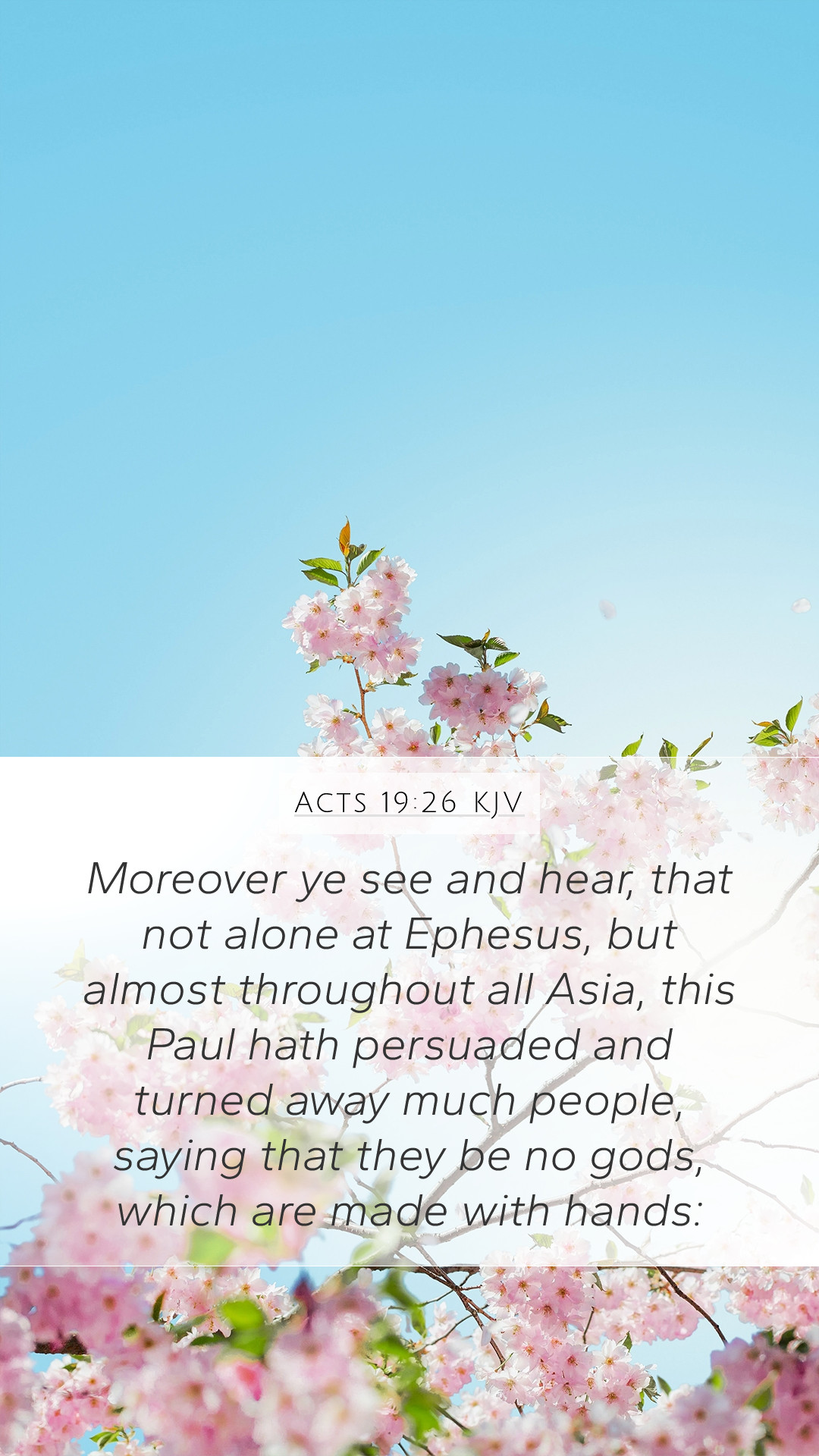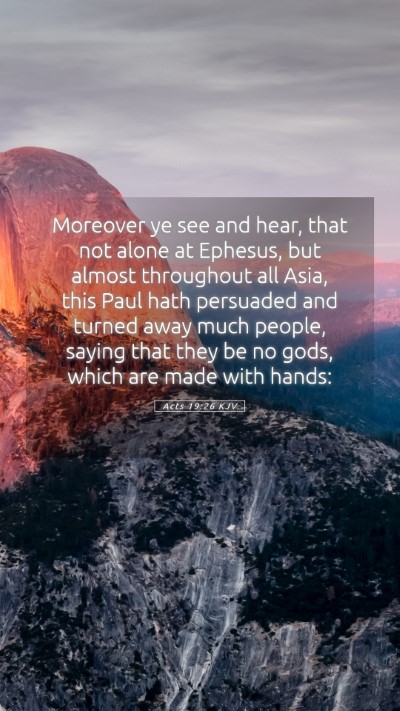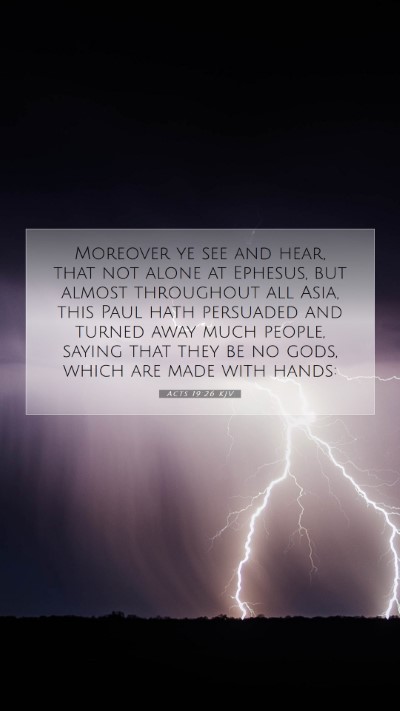Understanding Acts 19:26
The verse Acts 19:26 states: "Moreover ye see and hear, that not alone at Ephesus, but almost throughout all Asia, this Paul hath persuaded and turned away much people, saying that they be no gods, which are made with hands."
This verse, found in the book of Acts, provides a powerful glimpse into the impact of Paul’s ministry during his time in Ephesus. Let us delve into a comprehensive understanding of this scripture with insights from various public domain commentaries.
Bible Verse Meanings
This passage reflects the growing influence of Christianity and the apostolic preaching of Paul in Ephesus and throughout Asia Minor. The verse primarily highlights how Paul challenged the local idol worship, specifically the worship of handmade gods.
Bible Verse Interpretations
Paul’s teaching against idolatry struck at the heart of a culture steeped in polytheism, particularly the worship of Artemis, a goddess whose temple in Ephesus was one of the Seven Wonders of the Ancient World. Here are key interpretations of this verse:
- Resistance to Idolatry: Paul’s assertion that the gods made with hands are not true gods emphasizes the futility of idol worship.
- Spiritual Conviction: The phrase "turned away much people" indicates a significant spiritual awakening and conversion among the populace.
- Cultural Impact: The reference to "Ephesus" and "Asia" signifies the widespread impact of the early Christian message, transcending geographic boundaries.
Bible Verse Understanding
In understanding this scripture, we recognize that Paul’s teachings were not merely theological arguments; they were challenges to a deeply embedded cultural practice. The mention of "much people" turning away implies a transformative movement toward monotheism and away from the conventional practices of the local society.
Commentary Insights
Here are insights from notable commentaries:
- Matthew Henry: According to Henry, the success of Paul’s ministry illustrated the power of the Gospel in overcoming entrenched sin and idolatry, underscoring the truth that God’s Word can transform hearts and minds.
- Albert Barnes: Barnes highlights that Paul’s message provoked significant animosity from idol makers, demonstrating the economic and spiritual ramifications of turning from idolatry.
- Adam Clarke: Clarke emphasizes the importance of witnessing in the face of opposition, noting how the apostolic teachings challenged societal norms and called individuals to a higher spiritual calling.
Bible Verse Explanations
The explanation of Acts 19:26 reveals key themes in the early church's struggle against idolatry:
- Confrontation with Paganism: This verse serves as a confrontation against the power of false gods effectively drawing a line between true worship and counterfeit faith.
- Call to Authenticity: It suggests that true divinity cannot be fashioned or confined to material objects, urging believers to seek a genuine relationship with the Creator.
- Community Transformation: The substantial number of people influenced by Paul signifies a pivotal moment where community dynamics shifted towards faith in Christ.
Scripture Analysis
Acts 19:26 can be analyzed through various lenses: historical, cultural, and theological. Each perspective reveals layers of meaning to this impactful statement. The historical context of Ephesus as a center of trade and religion amplifies the radical nature of Paul’s proclamation.
Biblical Exegesis
A careful exegesis of Acts 19:26 helps us understand its theological implications. The contrast between the living God and idols represents the core message of the Gospel: salvation is available through faith in Christ, not through lifeless objects of worship.
Application of Bible Verses to Daily Life
In practical terms, Acts 19:26 challenges contemporary readers to assess their own lives concerning idolatry. While physical idols may not be prevalent today, the concept of idolatry can extend to modern-day distractions or obsessions—anything that takes priority over one’s relationship with God.
Additional Bible Cross References
- 1 Corinthians 10:14: "Wherefore, my dearly beloved, flee from idolatry."
- Acts 17:29: "Forasmuch then as we are the offspring of God, we ought not to think that the Godhead is like unto gold, or silver, or stone, graven by art and man's device."
- Isaiah 44:9-20: This passage discusses the futility of crafting idols and the foolishness of idol worship.
Bible Study Insights
For those participating in bible study groups or seeking online Bible study resources, Acts 19:26 serves as a launching point for discussions on:
- Understanding the historical context of early Christianity.
- The impact of biblical teaching on society.
- How contemporary believers can confront modern-day idols.
Conclusion
Acts 19:26 encapsulates the essence of the Gospel's transformative power against the backdrop of a culture steeped in idolatry. Through in-depth biblical analysis and commentary, we see how Paul's teachings resonated with many, affirming the call to authenticity in worship and the rejection of anything that comes between us and our relationship with God.


